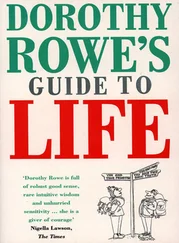DOROTHY ROWE
Beyond Fear
20th Anniversary Edition
 HARPER PERENNIAL London, New York, Toronto and Sydney
HARPER PERENNIAL London, New York, Toronto and Sydney
To my dear friends Helen, Galen, Marc and Naomi
Cover
Title Page DOROTHY ROWE Beyond Fear 20th Anniversary Edition HARPER PERENNIAL London, New York, Toronto and Sydney
Dedication To my dear friends Helen, Galen, Marc and Naomi
Introduction
Fear and the Fear of Fear
1 The Nature of Fear
• Fight or Flight
• Unavoidable Conflicts
• Fear of Life and Death
• Fear of Not Being Good Enough
2 Understanding the Nature of Fear
• Brains and Minds
• Our Greatest Fear
• A Choice of Defences
3 Fear Denied
• Denying Fear as ‘Character’
• Denying Other People’s Pain
4 Learning How to Deny
• The Perils of Childhood
• The Perils of Sexuality
• Denying Who You Are
5 How Society Responds to Mental Distress
• What Has Stayed the Same?
• What Has Changed, and for the Better?
The Alternatives
6 Choosing a Defence
• Popular but Confusing Diagnoses
• Choosing a Desperate Defence
7 A Bodily Solution?
• Not Frightened, Just Ill
• From Fear to Illness
• Punishing the Body to Ease the Mind
8 Turning Fear into Depression
• The Story of Depression
• Public Discourse - Muddle and Confusion
• Do Pills Cure Depression?
• The Way Out of the Prison
9 Turning Fear into Anxiety, Panic and Phobias
• Panic and the Fear of Panic
• Relinquishing Panic, Phobias and Fear
10 Turning Fear into Mania
• The Manic Defence
• Finding Yourself
11 Turning Fear into Obsessions and Compulsions
• Doubt, Hate and the Denial of Feeling
• Gaining Freedom
12 Turning Fear into Schizophrenia
• An Idea Called Schizophrenia
• Are Drugs the Answer?
• Hearing Voices
• The Road to Recovery
13 Turning Fear into Courage
Notes
Books and Websites
Index
Acknowledgements
Copyright
About the Publisher
Ideas about mental health and mental illness have changed over the last twenty years. Some old ideas like ‘chemical imbalance’ and ‘a gene for this and a gene for that’ linger on despite the fact that research has shown that these ideas are not hypotheses but myths. There is now a general acceptance of the idea that mental distress can be relieved by talking to a listener who has no vested interest in the situation which gave rise to the distress. The media take this idea for granted, but many members of the media fail to grasp what the talking therapies are, and speak of counselling as being a kind of unguent which is poured over some unfortunate person, as in ‘the victims were counselled’. No one would willingly talk to the media about being psychotic because the media, and many members of the public, still regard anyone diagnosed as schizophrenic as being a potential axe murderer. Yet prominent figures now speak openly of their depression, and pop stars seem to regard as obligatory a drug habit followed by a period in a fashionable psychiatric clinic. Politicians speak most sympathetically about the necessity for good mental health care, though the money for such a service rarely follows through. But, in all, when it comes to mental illness, everyone’s heart is in the right place.
Or is it? Despite all the changes for the better, the notion that madness is some strange thing that can fall upon an unwitting individual at any time is as strongly held as ever. The language in which we talk about madness might have changed, but the belief in that strange, wilful, sinister, mysterious force is still in the minds of most people, including the minds of those who ought to know better. To be seen to be mad is still regarded as being alien, no longer a full member of the human race. The Royal College of Psychiatrists and MIND, the National Association for Mental Health, have run a campaign aimed at removing the stigma of madness, or, in current terminology, ‘having a mental health problem’, while some sections of the media have a stylebook setting out what language may or may not be used (the Guardian stylebook bans ‘offensive and unacceptable terms such as “loony, nutter, psycho and schizo”’). However, little seems to have changed in private attitudes. Despite the courageous work by members of the user/survivor movement, the term ‘mental health problem’ is taking on all the negative connotations of ‘mentally ill’. Writing about the report issued by the National Institute for Clinical Excellence (NICE) following their study ‘Mental Health and the National Press’, 1the journalist Lynne Eaton summed up NICE’s results with, ‘Some of the reports about people suffering mental illness, particularly news stories, contain a level of discrimination that would be deemed unacceptable for most other social groups (except, perhaps, Gypsies and asylum seekers).’ 2
In their report, NICE recommended that mental health professionals be prepared to inform the press about mental health issues. However, the language used by the majority of mental health professionals is itself suspect. In 1987, when the first edition of Beyond Fear was published, psychiatrists spoke of mental illness. In the intervening years the word ‘illness’ has disappeared from the diagnoses used by psychiatrists, though not from their general discourse, to be replaced by the word ‘disorder’. When I first came to England in 1968 and worked in psychiatric hospitals there were only five basic mental illnesses, namely, schizophrenia, manic-depression, anxiety and phobias, obsessions and compulsions, and depression. The behaviours associated with these diagnoses are very distinctive and found in all societies and throughout recorded history. Many of the psychiatrists I worked with had their own idiosyncratic diagnoses for people who could not be fitted into any of these categories. At Middlewood Hospital (a Sheffield psychiatric hospital now mercifully closed) a favourite diagnosis was ‘Irish’. Over the years the idiosyncratic diagnoses of American psychiatrists were pooled and the more popular ones were presented in what is now a vast tome, the Diagnostic and Statistical Manual (DSM - Revision IV) which covers all the ways we can behave when faced with a very difficult situation. We are all in the DSM, at least once. Psychiatrists have medicalized life, and, in so doing, joined forces with an international business comparable in size, wealth and power with the arms trade and the oil business - the pharmaceutical industry.
Psychiatric ideas of mental illness and mental disorder are based on ‘the oversimplified medical model that forms part of the culture of psychiatry, the “illness-treatment-recovery model”’ which the retired psychiatrist David Whitwell calls ‘naïve psychiatry’. This ‘focuses on short-term improvements in symptoms as a main target for intervention. Although its origins are over fifty years old, and it reflects an outdated concept of what it is to recover from mental illness, it is still very much in evidence.’ In his many years of work in acute psychiatry, David Whitwell came to see that, ‘The claims made by professors of psychopharmacology and the drug companies for their products were never fulfilled in practice. The new clever therapies never seemed to produce the transformations they promised. And as time went on I could see less and less value in the elaborate systems of diagnosis and classification that are so central to psychiatry… I became more aware of the power and effectiveness of the non-specific factors which help people recover.’ 3
Читать дальше

 HARPER PERENNIAL London, New York, Toronto and Sydney
HARPER PERENNIAL London, New York, Toronto and Sydney










